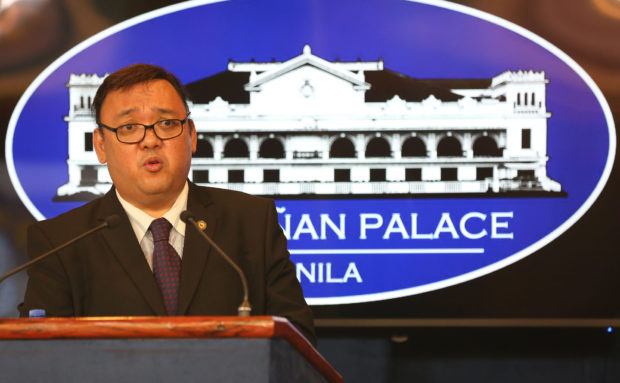Malacañang marked International Human Rights Day on Sunday by insisting it respected human rights even as rights groups continued to blame it for extrajudicial killings.
The Philippines is an active member of the United Nations Human Rights Council (UNHRC) and respect for human rights as state policy is enshrined in the 1987 Constitution, presidential spokesperson Harry Roque said.
“The Duterte administration works hard with the best interest of every Filipino, especially the poor and the marginalized and most vulnerable, as its main concern,” Roque said in a statement.
“These are the women and children in crises situations, persons with disabilities, indigenous peoples, migrant workers, older persons, people and communities displaced by natural and human-induced calamities, among others,” he said.
“The best way to do this is to ensure government efficiency and effectiveness that will translate to every Filipino getting a fighting chance to overcome poverty, to uplift one’s status in society and to live a life with higher dignity,” he added.
Roque said pulling the poor out of poverty was what inspired the government’s compliance with its human rights obligations.
“As a Nobel Peace Prize winner once said, ‘poverty is the absence of human rights.’ This government shall strive to bestow upon every Filipino an equal share in the nation’s progress,” Roque said.
“And we are pleased that this direction has been accepted by no less than the highest peer review body in the world on all matters of human rights, which is the UNHRC, when it unanimously accepted and commended the Outcome Report on the Philippines’ Universal Periodic Review this year,” he added.
Documented cases
But the human rights group Karapatan said on Sunday that it had documented the cases of 113 victims of political killings, 81 victims of torture and 121 new political prisoners under the Duterte administration.
“The Duterte administration should be held accountable for many more attacks against the people, including the thousands who are victims of extrajudicial killings perpetrated in the administration’s campaign against illegal drugs,” said Karapatan secretary general Cristina Palabay.
President Duterte’s war on drugs has cost more than 13,000 lives since he took office last year, according to rights groups, but the Philippine National Police acknowledges the killing of only more than 3,800 people and insists all the killings have been in self-defense.
The Supreme Court, hearing two challenges to Mr. Duterte’s brutal campaign against narcotics, ordered the government last week to submit to the tribunal the police reports on all those killings.
There have been thousands more deaths that police blame on a turf war among drug gangs but that rights groups claim are the handiwork of hired guns working for the police or by policemen themselves.
The PNP says those killings are under investigation.
‘Smokescreen justice’
Roque, speaking at the International Criminal Court (ICC) annual diplomatic conference at the United Nations in New York on Friday, gave assurance that the Duterte administration was investigating alleged human rights abuses.
But Param-Preet Singh, associate director of New York-based Human Rights Watch (HRW), said Roque’s assurance was only “smokescreen justice.”
In a statement after Roque’s speech, Singh said the Philippine government had been unwilling to investigate the alleged summary killings in Mr. Duterte’s war on drugs.
“The government has made no genuine efforts to seek accountability for drug war abuses. There have been no successful prosecutions or convictions of police implicated in summary killings despite compelling evidence of such abuses,” Singh said.
Roque’s claim that the government is ready to prosecute drug war abusers, she said, is “grotesquely deceptive in the face of this grim reality.”
“It is not known if and when the ICC will act in the Philippines,” said Singh, adding that a UN-led probe into drug killings could help expose abuses.
“[President] Duterte’s thousands of victims deserve more than empty platitudes in diplomatic circles. They deserve justice,” she said.
HRW noted that Mr. Duterte has publicly vowed to pardon, reinstate and promote officers convicted of extrajudicial killings.
‘Off-track’
Responding on Sunday, Roque said the HRW statement was “off-track.” He insisted that the administration had taken concrete steps to deal with police abuses.
“The latest remarks of Human Rights Watch that the Philippine government has not made genuine efforts to seek accountability on alleged abuses in our antidrug campaign are simply off-track,” he said.
“HRW has a penchant for playing blind, deaf and dumb, refusing to acknowledge the efforts of the administration in addressing alleged abuses of scalawag policemen,” he said.
Roque pointed out that the entire Caloocan City police force had been relieved after the killings of three teenagers, the PNP had been barred from carrying out antinarcotics operations, and the lead role in the war on drugs had been given to the Philippine Drug Enforcement Agency.
“Lest we forget, as much as due process governs the cases of alleged victims, the same must likewise be accorded to state agents accused of being perpetrators,” he added.


